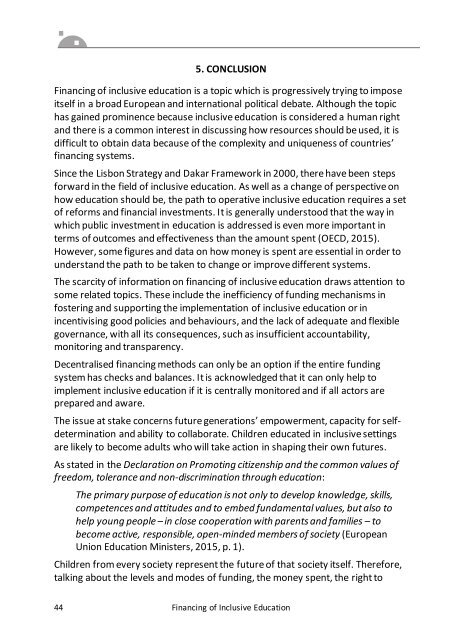EUROPEAN AGENCY
Financing%20of%20Inclusive%20Education%20-%20Background%20Information%20Report
Financing%20of%20Inclusive%20Education%20-%20Background%20Information%20Report
Create successful ePaper yourself
Turn your PDF publications into a flip-book with our unique Google optimized e-Paper software.
5. CONCLUSION<br />
Financing of inclusive education is a topic which is progressively trying to impose<br />
itself in a broad European and international political debate. Although the topic<br />
has gained prominence because inclusive education is considered a human right<br />
and there is a common interest in discussing how resources should be used, it is<br />
difficult to obtain data because of the complexity and uniqueness of countries’<br />
financing systems.<br />
Since the Lisbon Strategy and Dakar Framework in 2000, there have been steps<br />
forward in the field of inclusive education. As well as a change of perspective on<br />
how education should be, the path to operative inclusive education requires a set<br />
of reforms and financial investments. It is generally understood that the way in<br />
which public investment in education is addressed is even more important in<br />
terms of outcomes and effectiveness than the amount spent (OECD, 2015).<br />
However, some figures and data on how money is spent are essential in order to<br />
understand the path to be taken to change or improve different systems.<br />
The scarcity of information on financing of inclusive education draws attention to<br />
some related topics. These include the inefficiency of funding mechanisms in<br />
fostering and supporting the implementation of inclusive education or in<br />
incentivising good policies and behaviours, and the lack of adequate and flexible<br />
governance, with all its consequences, such as insufficient accountability,<br />
monitoring and transparency.<br />
Decentralised financing methods can only be an option if the entire funding<br />
system has checks and balances. It is acknowledged that it can only help to<br />
implement inclusive education if it is centrally monitored and if all actors are<br />
prepared and aware.<br />
The issue at stake concerns future generations’ empowerment, capacity for selfdetermination<br />
and ability to collaborate. Children educated in inclusive settings<br />
are likely to become adults who will take action in shaping their own futures.<br />
As stated in the Declaration on Promoting citizenship and the common values of<br />
freedom, tolerance and non-discrimination through education:<br />
The primary purpose of education is not only to develop knowledge, skills,<br />
competences and attitudes and to embed fundamental values, but also to<br />
help young people – in close cooperation with parents and families – to<br />
become active, responsible, open-minded members of society (European<br />
Union Education Ministers, 2015, p. 1).<br />
Children from every society represent the future of that society itself. Therefore,<br />
talking about the levels and modes of funding, the money spent, the right to<br />
44<br />
Financing of Inclusive Education




